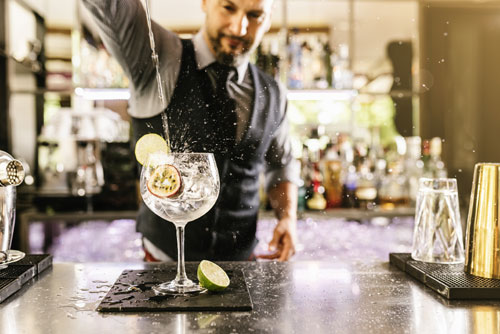Bartender Career
 A bartender is an individual that serves drinks and light foods to customers of restaurants, bars, or at catered events. Becoming a bartender could be a career option for someone that is looking to have a flexible career, meet a lot of people, and potentially earn a sizable income.
A bartender is an individual that serves drinks and light foods to customers of restaurants, bars, or at catered events. Becoming a bartender could be a career option for someone that is looking to have a flexible career, meet a lot of people, and potentially earn a sizable income.
In most cases, a bartender will work in a role in which they prepare drinks ordered directly by customers. The actual environment can range considerably from one venue to the next. The level of energy will likely depend on the clientele and focus of the bar or restaurant in which you are working. Some other bartenders may work in a service bar in which they prepare orders placed by waitresses and other employees.
Bartender Career Snapshot
Further details on a career as a bartender are listed below (statistics from the May 2016 Bureau of Labor Statistics and Onet Online):
is the typical yearly salary for bartenders.
increase in employment between 2014 and 2024.
have a High school diploma or equivalent while 32% have some college, but no degree.
Bartender Education
For those that are looking to become a bartender, having a higher education is not necessarily a requirement. Over 20% of total bartenders report having less than a high school degree while only 19% of bartenders report having a college degree. While it is not a requirement, some bars choose to only promote educated managers to higher management positions.
Bartender Job Duties
The overall duties of a bartender are pretty standard. A bartender will be responsible for knowing the full bar menu, knowing how to make key cocktails, and be able to provide quality service to customers. A bartender will also be required to be informed about local liquor laws and other regulations that can impact their profession.
Bartender Salaries
The compensation for a bartender can vary considerably. The base salary for a bartender is relatively low with a median of only $20,800 per year as shown in BLS.gov May 2016 reports. However, most bartenders depend largely on tips from customers. Depending on where they work, this can more than double their compensation if they are able to work the best shifts available.
Bartender Job Outlook
Overall, the job outlook for bartenders is positive. The demand and need for bartenders will always be somewhat tied to the overall strength of the economy. When times are good, more people will go out to eat at restaurants and bars. Since there is expected increases in the economy in future years, the total job growth for bartenders is expected to be more than 10% over the next 10 years.
Bartender Skills & Traits
| Bartender Skill Set: | Required Abilities: | Tools Used by Bartenders: | Typical Work Activities: |
|---|---|---|---|
| • Active Listening • Service Orientation • Social Perceptiveness • Speaking | • Oral Expression • Oral Comprehension • Speech Recognition • Arm-Hand Steadiness | • Carbonated beverage dispenser • Cocktail shakers or accessories • Commercial use cutlery • Commercial use strainers | • Performing for or Working Directly with the Public • Establishing and Maintaining Interpersonal Relationships • Communicating with Supervisors, Peers, or Subordinates • Getting Information |
Related Careers
Cashiers
No Formal Education Credential
Food Preparation Workers
No Formal Education Credential
Waiters & Waitresses
No Formal Education Credential


